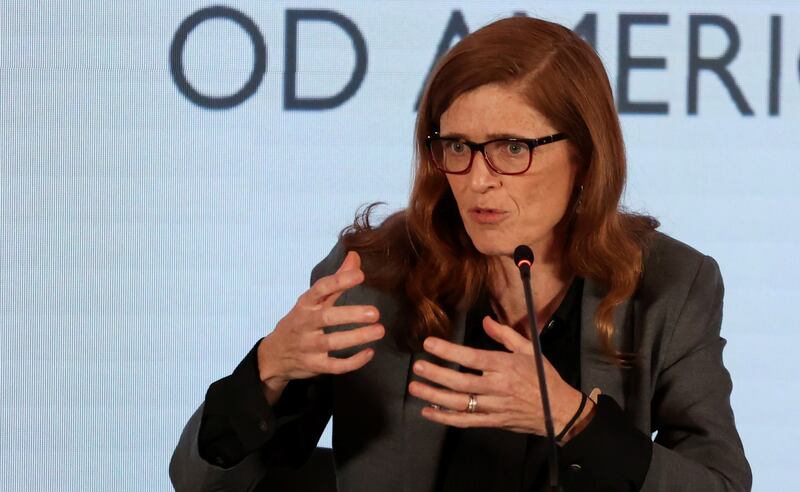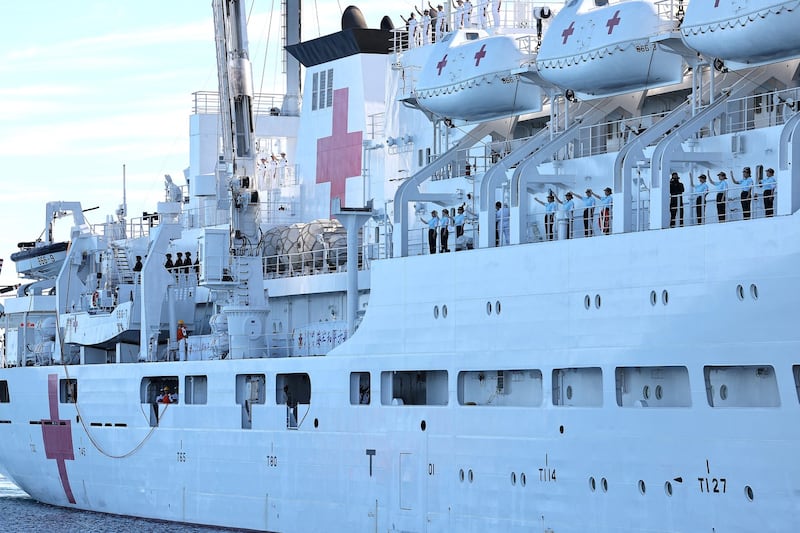The U.S. aid agency will open its expanded mission to Pacific island countries next week, aiming to show commitment to a region that now has the option of turning to China for infrastructure and development assistance.
The visit of the agency’s top official, former diplomat and journalist Samantha Power, to Papua New Guinea and Fiji from Aug 13-16 coincides with the Chinese navy’s hospital ship, Peace Ark, visiting several Pacific island countries to provide medical care.
Power’s trip would be an opportunity for the U.S. to listen to “partners and to discover how we can more effectively deliver on the priorities set by Pacific islanders,” said Michael Schiffer, assistant administrator for the Bureau of Asia at the United States Agency for International Development, or USAID, at a briefing on Thursday.
The U.S. government outlined plans to boost its USAID presence during a summit with Pacific island leaders in September last year that was a response to China’s inroads in the region.
U.S. participation in the vast ocean region dwindled after the early 1990s disintegration of its Cold War-era rival, the Soviet Union. Its diminished diplomatic presence was an opening for China’s government to expand its influence by helping to meet the substantial development needs of economically-lagging Pacific island nations.
In Papua New Guinea, Power will mark the elevation of the USAID presence there to a country representative office overseeing USAID programs in Solomon Islands, Vanuatu and Papua New Guinea. In Fiji’s capital Suva, she will open what the agency says is a reestablished regional mission that will work with nine Pacific island countries.
In Fiji, she will also address an annual conference of defense chiefs, which is jointly hosted by Fiji’s military and the U.S. Indo-Pacific Command, on the subject of “underpinning U.S. engagement in the region based on defense, diplomacy and development,” according to Schiffer.

Pacific islands nations hope to benefit from the China-U.S. rivalry but are also critical of what some see as the gap between reality and the rhetoric of donors and multilateral financial institutions, particularly on insufficient financing for projects to withstand climate change and projections for sea-level rise this century.
“They say they are with us on our regional threats but there’s a disconnect between this and the resources they offer on the table,” Fiji’s Finance Minister Biman Prasad said Thursday at a meeting of the region’s economic ministers.
China, over several decades, has become a substantial source of trade, infrastructure and aid for developing Pacific island countries as it seeks to isolate Taiwan diplomatically and build its own set of global institutions.
The Solomon Islands has been China’s highest profile success in building influence among Pacific island countries in recent years. It switched its diplomatic recognition to Beijing from Taiwan in 2019 and last year signed a security pact with China, alarming the U.S. and allies such as Australia, who fear it could pave the way for a Chinese military presence.
Schiffer said the U.S. and Solomon Islands governments are continuing to discuss a greater contribution of U.S. aid and infrastructure for the country of 700,000 people, which grapples with lack of roads, spotty telecommunications and insufficient basic healthcare.
A USAID project in the most populous Solomon Islands province, Malaita – which in February ousted premier Daniel Suidani who blocked China-funded aid and projects – had disappointed locals by not providing immediate benefits.

The Peace Ark hospital ship has recently visited Tonga, Kiribati and Vanuatu as part of its current mission in the Pacific, according to Chinese state media and Pacific island media reports.
Its stop in Tonga last month happened just a couple of days after a visit by the U.S. Secretary of State Antony Blinken to underline the recent opening of a U.S. embassy in the Polynesian kingdom.
Meanwhile, the U.S. Navy hospital ship, Mercy, will be docked in the Solomon Islands capital Honiara in November to provide medical care when the city hosts the Pacific Games, according to the Solomon Islands government.
Eileen Natuzzi, a Pacific islands health expert and affiliate faculty at Georgetown University’s Centre for Australian, New Zealand and Pacific Studies, has said that the hulking white hulled hospital ships are only “big public relations.”
“Regardless of which country provides them, military medical missions do not address the significant health system issues that people living in Pacific Island countries currently face,” she said in a July commentary for the Lowy Institute, an Australian think tank.
“These problems require a much deeper long-term commitment than the Mercy or Peace Ark can achieve,” she said.
BenarNews is an RFA-affiliated online news organization.
